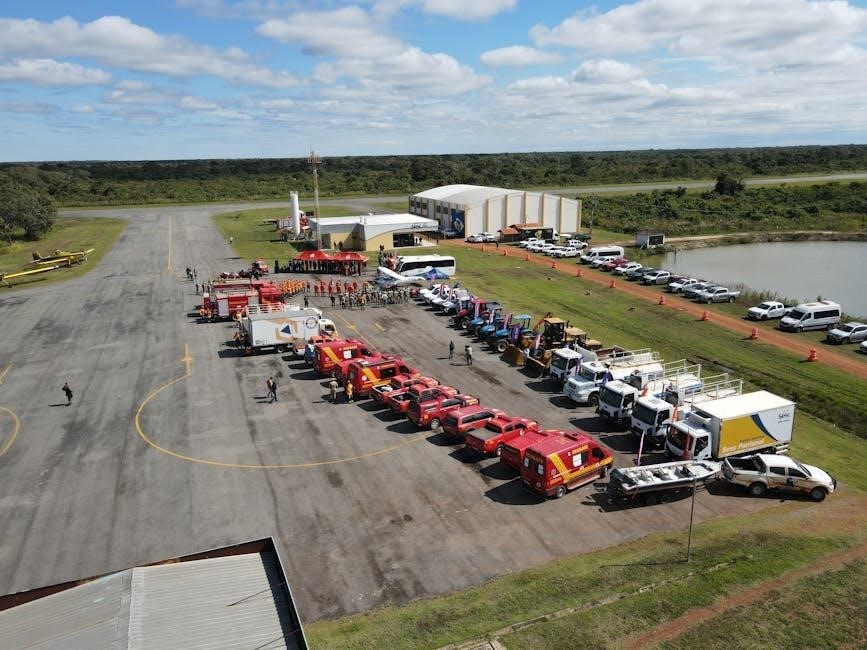An Operations Manager plays a pivotal role in ensuring operational efficiency by overseeing day-to-day activities, planning, and directing organizational operations to achieve business objectives effectively.
Overview of the Role
The Operations Manager is a critical role responsible for overseeing the execution of organizational processes, ensuring efficiency, productivity, and adherence to quality standards. This position involves strategic planning, process optimization, and team coordination to align operations with business objectives. The role requires strong leadership, decision-making, and problem-solving skills to manage daily activities effectively. Operations Managers are tasked with improving performance metrics, reducing operational risks, and maintaining compliance with safety and regulatory standards. They also play a key role in fostering interdepartmental collaboration and resource allocation to achieve organizational goals. By ensuring operational integrity, the Operations Manager drives sustainable growth and success for the organization.
Importance in Organizational Efficiency
The Operations Manager is essential for maintaining organizational efficiency by optimizing processes, managing resources, and ensuring adherence to quality and safety standards. They streamline workflows, reduce operational risks, and enhance productivity, directly contributing to the organization’s profitability and growth. By fostering effective interdepartmental communication and aligning operational activities with strategic goals, the Operations Manager ensures seamless execution of tasks. Their role is critical in identifying inefficiencies, implementing improvements, and maintaining operational integrity. Through strong leadership and decision-making, they enable the organization to achieve its objectives while minimizing costs and maximizing output, making them a cornerstone of organizational success and stability.

Key Duties of an Operations Manager
An Operations Manager oversees staff supervision, interdepartmental communication, task allocation, quality compliance, project coordination, production oversight, supply chain management, and operational integrity maintenance.
Supervision and Management of Staff
An Operations Manager is responsible for supervising and managing staff, ensuring effective team performance. This includes hiring, training, and developing employees to enhance productivity and efficiency. They lead by example, fostering a positive work environment and addressing performance issues promptly. The manager also assigns tasks, sets goals, and monitors progress to achieve organizational objectives. Effective communication and interpersonal skills are crucial in resolving conflicts and motivating team members. Additionally, the Operations Manager ensures compliance with company policies and safety standards, maintaining a safe and compliant workplace. Their leadership directly impacts employee morale, retention, and overall operational success.
Facilitating Interdepartmental Communication
An Operations Manager ensures seamless communication across departments, acting as a central point for information flow. They organize meetings, prepare reports, and use communication tools to maintain alignment. By fostering collaboration, they help departments work cohesively toward shared goals. This role involves mediating conflicts, clarifying expectations, and ensuring all teams are informed. Effective communication prevents operational disruptions and enhances efficiency. The manager also ensures that feedback loops are in place, allowing for continuous improvement. Their ability to connect different functions supports strategic decision-making and drives organizational success. Strong interpersonal skills are essential to maintain open lines of communication and promote a culture of transparency and teamwork.

Allocating Tasks and Resources
An Operations Manager is responsible for allocating tasks and resources efficiently to ensure smooth operations. This involves assessing project requirements, assigning responsibilities based on team members’ strengths, and ensuring resources like equipment, materials, and budgets are used optimally. They prioritize tasks to meet deadlines and objectives, balancing workload distribution to avoid bottlenecks. Effective allocation enhances productivity, reduces waste, and ensures alignment with organizational goals. The manager also monitors resource utilization, making adjustments as needed to maintain efficiency. By ensuring the right resources are available at the right time, they enable teams to perform at their best, driving overall operational success and achieving desired outcomes. This role is critical for maintaining organizational momentum and effectiveness.
Ensuring Compliance with Safety and Quality Standards
An Operations Manager must ensure the organization adheres to safety and quality standards, implementing measures to maintain high operational integrity. They conduct regular audits and risk assessments to identify potential hazards and ensure compliance with regulatory requirements. By enforcing quality control processes, the manager guarantees that products or services meet customer expectations and industry benchmarks. Training employees on safety protocols and quality procedures is essential to prevent incidents and improve overall performance. The manager also updates policies to reflect changing regulations, ensuring the organization remains compliant and minimizes risks. This role is vital for safeguarding employees, customers, and the organization’s reputation while maintaining operational excellence and legal adherence.
Project Management and Coordination
An Operations Manager is responsible for overseeing and coordinating projects to ensure they are completed on time, within budget, and to the desired quality standards. This involves defining project scopes, setting timelines, and allocating resources effectively. The manager collaborates with various departments to ensure alignment and communication, addressing potential risks and bottlenecks proactively. They utilize project management tools and software to monitor progress, track milestones, and adjust plans as needed. By maintaining clear visibility and control over projects, the Operations Manager ensures seamless execution and delivery, ultimately driving organizational goals and objectives. Effective project management and coordination are critical to achieving operational success and meeting stakeholder expectations.

Overseeing Production Processes
An Operations Manager ensures the smooth operation of production processes by monitoring workflows, optimizing efficiency, and maintaining quality standards. They oversee the production schedule, manage equipment maintenance, and ensure adherence to safety protocols. The manager works closely with production teams to identify bottlenecks, implement improvements, and maximize output. Effective supervision of production processes involves coordinating with supply chain and logistics to ensure timely delivery of materials and finished goods. By maintaining operational integrity, the Operations Manager plays a crucial role in meeting customer demands, reducing costs, and enhancing overall productivity. This oversight ensures that production runs efficiently, safely, and aligns with organizational objectives.
Managing Supply Chain and Logistics
An Operations Manager is responsible for coordinating and optimizing the supply chain and logistics processes to ensure efficient delivery of materials and products. This involves working with suppliers, logistics teams, and internal stakeholders to streamline operations. Key duties include managing inventory levels, monitoring shipping schedules, and ensuring timely delivery of goods. The manager also identifies bottlenecks and implements solutions to enhance supply chain performance; Effective supply chain management reduces operational costs, improves delivery times, and maintains customer satisfaction. By leveraging technology and data analytics, the Operations Manager can predict demand fluctuations and adjust logistics strategies accordingly, ensuring a seamless flow of goods and resources across the organization.
Maintaining Operational Integrity
Maintaining operational integrity is a critical responsibility of an Operations Manager, ensuring that all processes align with organizational goals and ethical standards. This involves implementing internal controls, conducting regular risk assessments, and updating risk registers to mitigate potential threats. The manager must ensure compliance with safety, quality, and regulatory standards across all operations. By fostering a culture of accountability and transparency, the Operations Manager safeguards the organization’s reputation and operational consistency. Additionally, they oversee the implementation of measures to maintain operational integrity, ensuring that all activities are conducted ethically and responsibly. This role is essential for sustaining trust and reliability within the organization and among its stakeholders, thereby promoting long-term success and stability.

Key Responsibilities of an Operations Manager
An Operations Manager is responsible for managing operations, improving efficiency, ensuring compliance, and overseeing production, supply chain, and safety standards to achieve organizational goals effectively.
Overall Productivity and Quality Control
An Operations Manager is responsible for driving overall productivity and maintaining high-quality standards across organizational processes. This involves monitoring performance metrics, implementing quality control measures, and ensuring adherence to established protocols. They optimize workflows to minimize waste and maximize efficiency, aligning operations with strategic goals. Conducting regular audits and assessments helps identify areas for improvement, ensuring consistent delivery of products or services. By fostering a culture of continuous improvement, the Operations Manager plays a crucial role in enhancing operational excellence and customer satisfaction. Effective quality control ensures compliance with industry standards, reducing errors and boosting organizational reputation.
Risk Assessments and Updating Risk Registers
Conducting regular risk assessments and updating risk registers are critical responsibilities of an Operations Manager. This involves identifying potential operational risks, evaluating their impact, and prioritizing mitigation strategies. By maintaining accurate and up-to-date risk registers, the manager ensures that all identified risks are actively monitored and addressed. This process helps in minimizing disruptions, ensuring compliance with safety standards, and safeguarding organizational assets. Regular reviews and updates to the risk register enable proactive decision-making, allowing the organization to respond effectively to emerging threats. This role is essential for maintaining operational integrity and ensuring business continuity in the face of uncertainties.
Implementing Internal Controls
Implementing internal controls is a vital duty of an Operations Manager, ensuring operational integrity and compliance with organizational standards. This involves establishing and enforcing policies, procedures, and systems to monitor and regulate workflows. Internal controls help prevent errors, fraud, and inefficiencies, while maintaining the accuracy and reliability of processes. By setting clear guidelines and accountability measures, the manager ensures that all operations align with strategic goals and legal requirements. Regular audits and evaluations of these controls further strengthen their effectiveness. This role is crucial for fostering a culture of transparency, accountability, and continuous improvement within the organization, thereby safeguarding its resources and maintaining stakeholder trust.
Financial Oversight and HR Management
An Operations Manager is responsible for financial oversight, ensuring budget adherence, cost control, and resource allocation. They monitor expenses, analyze financial reports, and implement measures to optimize profitability. In HR management, they oversee recruitment, payroll, employee training, and performance evaluations. The manager ensures compliance with labor laws and maintains a positive work environment. They also handle employee relations, addressing grievances and fostering communication. This dual role ensures smooth operational and human resource functions, aligning financial and HR strategies with organizational goals. Effective financial oversight and HR management are critical for maintaining efficiency, productivity, and employee satisfaction, ultimately driving business success and sustainability.
Leading Organizational Functions
An Operations Manager plays a crucial role in leading organizational functions, driving revenue growth, and ensuring alignment with strategic goals. They oversee key departments, teams, and projects, fostering collaboration and accountability. The manager sets operational standards, ensures compliance with regulations, and implements processes to enhance efficiency. By leading organizational functions effectively, they enable the company to achieve its mission and objectives. Their leadership is instrumental in maintaining operational integrity, driving productivity, and ensuring all activities align with the organization’s vision. This role is essential for sustaining smooth operations and achieving long-term success.
Ensuring Timelines and Budgets Are Met
An Operations Manager is responsible for ensuring that all projects and operations are completed within established timelines and budgets. They plan, coordinate, and monitor activities to guarantee adherence to deadlines and financial constraints. This involves allocating resources efficiently, tracking progress, and addressing potential delays or cost overruns. The manager also conducts regular reviews to ensure alignment with organizational goals and adjusts strategies as needed. By maintaining strict oversight of timelines and budgets, they help the organization achieve its objectives without compromising quality or efficiency. This role is critical in delivering results that meet both stakeholder expectations and financial requirements, ensuring overall operational success.

Skills and Qualifications Required
An Operations Manager must possess strong leadership, decision-making, and communication skills. They need expertise in operational management, project coordination, and budgeting, along with analytical and problem-solving abilities.
Leadership and Decision-Making Abilities
Strong leadership and decision-making skills are essential for an Operations Manager. They must guide cross-functional teams, ensure alignment with organizational goals, and make strategic decisions to optimize efficiency. The ability to allocate resources effectively, supervise staff, and manage operational risks is critical. Operations Managers must also lead by example, fostering a culture of accountability and continuous improvement. Their decision-making often impacts production processes, safety standards, and cost management. Effective leaders in this role are adept at resolving conflicts, motivating teams, and driving results-oriented outcomes. These skills ensure smooth operations and contribute to the overall success of the organization.
Operational Management Expertise
Operational management expertise is central to an Operations Manager’s role, encompassing comprehensive knowledge of processes, systems, and tools. They must effectively manage supply chains, production workflows, and resource allocation to ensure efficiency. Expertise in quality control, risk assessment, and compliance with safety standards is vital. Operations Managers also optimize operational processes, identify bottlenecks, and implement improvements. Their technical proficiency in areas like project management software and data analytics enables informed decision-making. By leveraging this expertise, they maintain operational integrity, ensuring that all activities align with organizational objectives and industry best practices. This expertise is crucial for driving productivity, reducing costs, and enhancing overall organizational performance.
Project Management Skills
Project management skills are essential for Operations Managers to effectively oversee and coordinate complex projects from start to finish. They must lead cross-functional teams, allocate resources, and ensure tasks are completed on time and within budget. Strong organizational and communication abilities are critical to manage competing priorities and stakeholders. Operations Managers use tools like project management software to track progress and identify potential bottlenecks. They also ensure adherence to quality standards and safety protocols throughout the project lifecycle. By maintaining a focus on timelines, budgets, and deliverables, they ensure successful project outcomes that align with organizational goals. These skills are vital for driving efficiency and achieving operational excellence.
Communication and Interpersonal Skills
Effective communication and interpersonal skills are crucial for Operations Managers to build strong relationships with staff, departments, and external partners. They must articulate clear expectations, provide constructive feedback, and actively listen to concerns. Strong interpersonal skills enable them to motivate teams, resolve conflicts, and foster a collaborative work environment. Operations Managers also communicate with senior management to align operational goals with organizational strategies. Their ability to negotiate, influence, and coordinate across diverse groups ensures seamless operations. These skills are essential for maintaining a cohesive and productive workplace, driving teamwork, and achieving organizational objectives effectively. Clear and consistent communication helps in minimizing misunderstandings and maximizing operational efficiency.

Tools and Technologies Used
Operations Managers utilize project management software, supply chain management tools, and ERP systems to streamline workflows, optimize logistics, and enhance operational efficiency. These tools enable effective task organization and resource allocation, ensuring seamless operations and data-driven decision-making to meet organizational goals.
Project Management Software
Operations Managers rely on project management software to streamline task allocation, track progress, and ensure timely delivery of projects. Tools like Asana, Trello, and Microsoft Teams enable efficient collaboration, while platforms such as Monday.com and Basecamp help organize workflows. These tools allow managers to assign tasks, monitor milestones, and maintain clear communication across teams. By utilizing these technologies, Operations Managers can ensure adherence to timelines and budgets, enhancing overall operational efficiency. Additionally, project management software provides real-time updates, enabling data-driven decision-making and improving coordination between departments. This ensures alignment with organizational goals and fosters a culture of accountability and productivity within the team.

Supply Chain Management Tools
Operations Managers utilize supply chain management tools to optimize logistics, procurement, and inventory processes. Software such as SAP, Oracle, and Manhattan Associates enables efficient tracking of shipments, demand forecasting, and inventory control. These tools facilitate seamless communication between suppliers, manufacturers, and distributors, ensuring timely delivery of materials and products. By automating workflows and providing real-time data, supply chain management tools help Operations Managers reduce costs, minimize delays, and improve overall supply chain visibility. Additionally, these systems support risk management by identifying potential disruptions and enabling proactive solutions. Effective use of these tools ensures a smooth and sustainable supply chain, directly contributing to organizational efficiency and customer satisfaction.

Industry-Specific Variations
Operations Managers adapt strategies to fit industry-specific needs, such as manufacturing, healthcare, or education, ensuring processes align with sector requirements and regulations for optimal efficiency and compliance.
Differences in Manufacturing vs. Service Industries
In manufacturing, Operations Managers focus on production processes, supply chain logistics, and quality control of goods. They oversee equipment maintenance, inventory management, and ensure adherence to safety standards. In contrast, service industries emphasize customer satisfaction, staff training, and process efficiency. Operations Managers in services often manage teams, coordinate field operations, and ensure timely delivery of services while maintaining quality and compliance with regulations. While manufacturing prioritizes physical output and inventory, service industries focus on intangible deliverables and customer experience, requiring tailored strategies to meet distinct operational demands and industry-specific challenges.
Unique Challenges in Different Sectors
Operations Managers face distinct challenges across various industries. In manufacturing, managing supply chain disruptions and optimizing production processes are critical. Service industries require ensuring customer satisfaction and maintaining high standards of delivery. Healthcare operations demand strict compliance with regulations and patient care quality. Educational institutions focus on resource allocation and campus safety. Technology sectors face rapid innovation and scalability pressures. Each sector presents unique operational hurdles, necessitating tailored strategies to address industry-specific demands and ensure seamless operations. Effective adaptation to these challenges is essential for maintaining efficiency, quality, and compliance, ultimately driving organizational success and sustainability in diverse environments.

Challenges Faced by Operations Managers
Operations Managers confront operational risks, adapt to industry changes, and optimize processes while ensuring compliance, safety, and quality standards across diverse sectors and evolving business environments.
Managing Operational Risks
Managing operational risks is a critical duty of an Operations Manager, involving regular risk assessments and updating risk registers to identify and mitigate potential threats. This includes implementing internal controls and measures to maintain operational integrity, ensuring compliance with safety and quality standards. By proactively addressing risks, Operations Managers can minimize disruptions, safeguard assets, and maintain smooth workflows. Effective risk management also involves fostering a culture of accountability and continuous improvement, ensuring that all processes align with organizational goals and regulatory requirements; This role requires strong analytical skills and the ability to develop strategies that balance efficiency with risk mitigation, ultimately contributing to the organization’s long-term stability and success.
Adapting to Industry Changes
An Operations Manager must stay ahead of industry trends and adapt to changes to maintain competitiveness. This involves monitoring market shifts, technological advancements, and regulatory updates. By fostering innovation and collaboration across departments, Operations Managers can align processes with evolving demands. They also play a key role in training teams to embrace new tools and methodologies, ensuring seamless transitions. Proactively addressing industry changes helps organizations remain agile, efficient, and responsive to customer needs. Effective adaptation not only mitigates risks but also drives growth, ensuring the organization stays relevant in a dynamic business environment. This requires strategic thinking, flexibility, and a commitment to continuous improvement.
Best Practices for Operations Managers
Continuous process improvement, effective team management, and staying informed about industry trends are essential best practices for Operations Managers to maintain operational efficiency and drive success.
Continuous Process Improvement
Continuous process improvement is a key responsibility of Operations Managers, focusing on enhancing operational efficiency and effectiveness. This involves regularly assessing and optimizing workflows, identifying inefficiencies, and implementing changes to improve productivity. By fostering a culture of innovation and collaboration, Operations Managers can drive sustainable growth. They analyze data to identify areas for improvement and develop strategies to address them. Staying updated with industry trends and best practices ensures they adopt cutting-edge methodologies. Tools like Lean and Six Sigma are often utilized to streamline processes, reduce waste, and enhance quality. This proactive approach not only boosts performance but also ensures alignment with organizational goals, leading to increased customer satisfaction and competitiveness.
Effective Team Management
Effective team management is crucial for Operations Managers to ensure high performance and employee satisfaction. This involves leading by example, fostering open communication, and creating a collaborative environment. Operations Managers motivate team members, provide training, and recognize achievements to enhance morale. They also address conflicts and ensure alignment with organizational goals. By empowering employees and delegating tasks effectively, Operations Managers maximize productivity and accountability. Regular feedback sessions and performance evaluations help identify areas for growth, ensuring continuous development. Strong interpersonal skills and emotional intelligence enable Operations Managers to build trust and drive engagement, ultimately contributing to the organization’s success.





